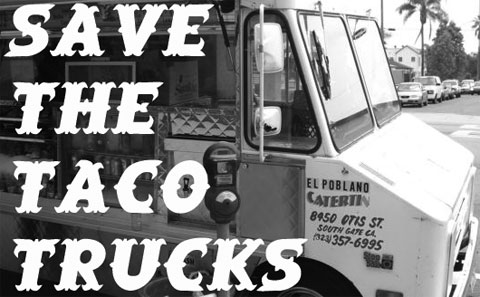
We've been reporting on the disturbing trend of taco trucks being harassed by short-sighted and vengeful anti-taco lifestyle officials around the state (and country). Now the LA Times has devoted space to covering this horrible trend. An excerpt:
Last summer, the City Council took action.
No longer could loncheras set up for hours at parks or construction sites. Instead, they could stop only at sites where a bathroom was available to patrons, and stay just half an hour, barely enough time to set up and prepare a meal or two before having to break down and drive away again. In addition, all employees had to get background checks.
Palos Verdes Estates is hardly the only community to crack down on the trucks in recent years. Los Angeles County supervisors last year passed an ordinance making it a misdemeanor for taco trucks to park in unincorporated spots for more than an hour after restaurateurs complained they were siphoning off customers. A Superior Court judge later ruled the law unconstitutional.
Similar restrictions have been imposed nationwide in cities large and small, rural and metropolitan, from Hughson, Calif., to Houston, and in seemingly unlikely spots, including Des Moines; Charlotte, N.C.; and Hillsboro, Ore.
As the Latino population has grown across the United States, so have the number of taco trucks catering to them.
How communities approach them varies widely.
Suburban Jefferson Parish, La., banned them. So did Hughson, in the San Joaquin Valley. But nearby Turlock established a taco truck plaza.
"They're very popular among city employees," said Turlock's planning director, Debbie Whitmore.
Officials in many communities say the aim of their regulations is to ensure the food is sanitary, safety codes are followed and noise, late-night crowds and garbage don't get out of control. Some cities have passed ordinances that don't explicitly ban taco trucks but make it all but impossible for them to operate profitably.
Sometimes charges of racism are thrown at taco truck opponents, such as when an official in Gwinnett County, Ga., was reported to have called the growth of taco trucks and other mobile vendors "gypsy-fication," or when a Houston-area politician said, "I don't want us to become, you know, a Third World area."







